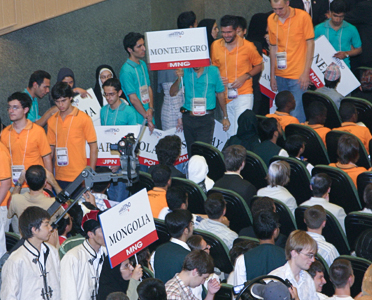Home > About IPhO > About IPhO
International Physics Olympiad

What is IPhO?
In recognition of the growing significance of physics in all fields of science and technology as well as in general education of young people, and with the aim of enhancing the development of international contacts in the field of school education in physics, an annual physics competition is organized for secondary school students. The competition is called the International Physics Olympiad (IPhO) and is a competition between individuals.
Short history of the Olympiad
For the first time the International Physics Olympiad was held in Warsaw, Poland in 1967 with only 5 countries participating. Competition was organised by Prof. Czesław Ścisłowski. The Olympiad expanded during the years peaking 92 participating delegations during IPhO 2018 in Portugal. During these years many changes in delegation size, number of theoretical and experimental problems and their difficulty were introduced. Organisational and academical aspects of the Olympiad are now represented in the Olympiad’s statutes and syllabus which can be changed only during International Board meetings.
Who can participate in the Olympiad?
Each participating country can send a delegation, normally consisting of five students and two accompanying persons. The contestants shall be students of general or technical secondary schools i.e. schools which cannot be considered technical colleges. Students who have finished their school examinations in the year of the competition can be members of the team as long as they have not commenced their university studies. The age of the contestants should not exceed twenty years on the 30th of June of the year of the competition. The delegation leaders must be specialists in Physics or Physics teachers, capable of solving the problems of the competition competently. Each of them should speak English.
What type of exams are presented?
The competition has two parts - theoretical and practical exams, each five hours long, and is scheduled with one day of rest between the examinations. Theoretical exam consists of three problems while experimental exam can consist of one or two problems from various fields of physics. Theoretical exam is worth 30 points while experimental exam gives maximum of 20 points. Problems usually require creative thinking and the scope of knowledge specified in the Syllabus of the Olympiad. Exam problems are translated by the team leaders into the contestants` languages one day before examinations.
